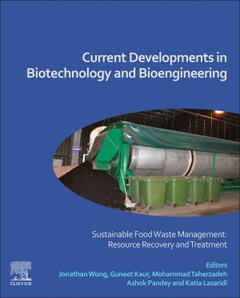Description
Current Developments in Biotechnology and Bioengineering
Sustainable Food Waste Management: Resource Recovery and Treatment
Coordinators: Wong Jonathan, Kaur Guneet, Taherzadeh Mohammad, Pandey Ashok, Lasaridi Katia
Language: English
Subject for Current Developments in Biotechnology and Bioengineering:
Keywords
Anaerobic digestion; Animal feed; Awareness raising; Biobased conversions; Biochar; Bioevaporation; Biopolymers; Bulk chemicals; Cattle feed; Circular economy; Cockroach; Codigestion; Collection; Collection infrastructure; Collection vehicle; Composting; Cricket; Direct conversion; Donation; Door-to-door collection; Earthworm; Elemental composition; Feed conversion ratio (FCR); Fermentations; Fish feed; Fly larvae; Food for feed; Food loss; Food supply chain; Food surplus; Food wastage; Food waste; Food waste generation; Food waste legislation; Food waste policy; Food waste prevention; Food waste reduction projects; Food waste strategies; FW valorization; Green technology; High-value products; Hydrogen; Hydrolytic enzymes; Inhibition factors; Kerbside collection; Life-cycle assessment; Measuring food waste; Methane; Monitoring; Nitrogen conservation; pH alleviation; Phased anaerobic system; Physicochemical properties; Platform chemicals; Pretreatment; Prevention; Product recovery; Properties; Pyrolysis and gasification; Redistribution; Resource recovery; Separate collection; Struvite; Sustainable chemicals; Sustainable development; Temperature; Transformations; Volatile fatty acids; Waste bioconversion; Waste hierarchy
446 p. · 19x23.3 cm · Paperback
Description
/li>Contents
/li>Readership
/li>Biography
/li>Comment
/li>
1. Food waste and sustainable management technologies: An introduction 2. Food waste properties and chemistry 3. Food waste generation and collection 4. Closing the food chain loop through waste prevention and recovery 5. Bioconversion technologies: Food Waste Composting: Challenges and Possible Approaches 6. Bioconversion technologies: Anaerobic digestion of food waste 7. Microbial conversion of food waste: volatile fatty acids platform 8. Bioconversion technologies: Insect and worm farming 9. Bioconversion Technologies: Hydrolytic Enzyme Treatment of Food Waste 10. Bio-products from food waste 11. Conversion of food waste to animal feeds 12. Gasification and pyrolysis of food waste 13. Emerging technologies for treatment of food waste 14. Food waste policy 15. Life-cycle assessment and sustainability assessment of food waste utilization
Dr Guneet Kaur is currently an Assistant Professor at Hong Kong Baptist University, Hong Kong. Her research focusses on bioprocess engineering, integrated fermentation-separation systems, high cell density fed-batch and continuous fermentations, mathematical modelling and optimization of bioprocesses, and recombinant DNA technology for production of high-value added bio-based products such as platform chemicals, biofuels, biotherapeutics and biosurfactants. She has 14 publications (11 as first author; 2 as co-first author) in high impact factor journals and her work is well cited by researchers worldwide giving an h-index of 8 (Google Schol
- Covers recycling to value-added products using sustainable concepts and methodologies
- Provides an exhaustive description of general treatment options and their evaluation guidelines in terms of cost, energy consumption, and waste generation, enabling readers to understand the principles behind various recovery and treatment schemes
- Describes existing and emerging food waste recycling technologies, products obtained, and process efficiencies
- Offers a thorough account of critical factors and challenges in food waste valorization, such as handling of new emerging contaminants, end-product purity, and life-cycle assessment

